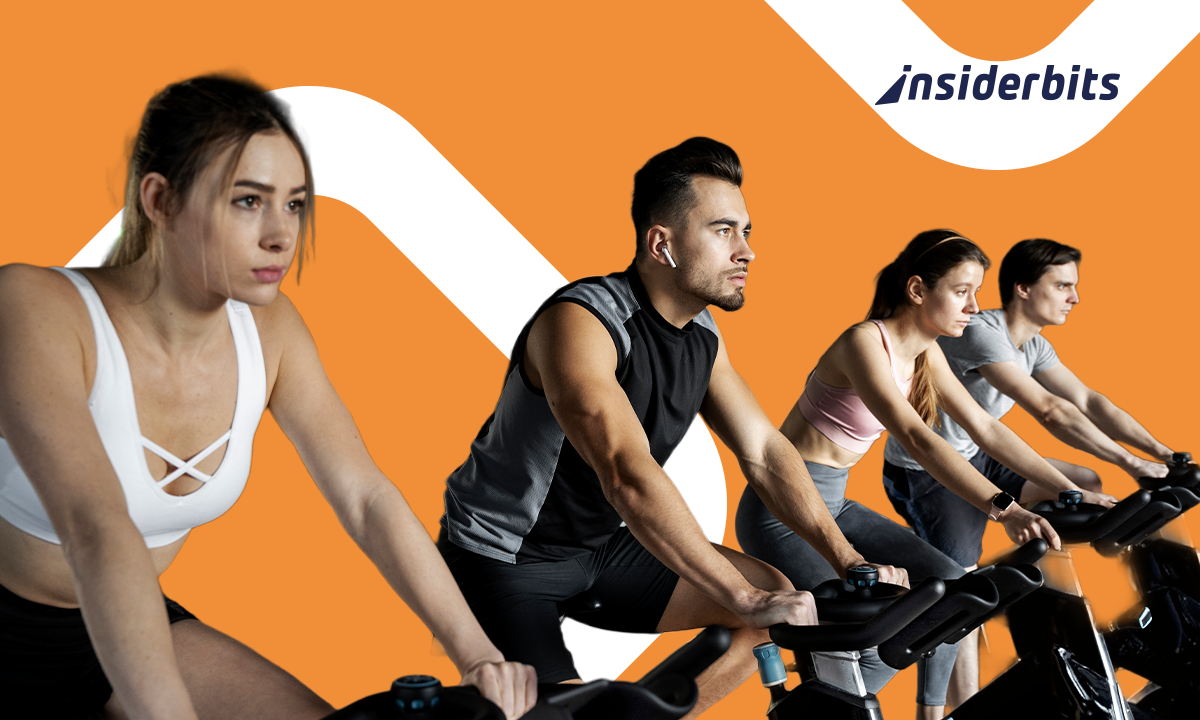Dealing with bad weather, traffic, and that one hill that always throws off your mood is the only thing worse than actually riding a bike outside. The solution to your pedal fix without putting your life in danger is indoor cycling, which is climate-controlled and doesn’t require a helmet. Spinning at home could be your key to fitness without the hassle.
However, you need some important information before converting your living room into a makeshift spin studio. Starting indoor cycling doesn’t require selling your kidney, though those expensive bikes may make you think about it. There are low-cost setups and sophisticated virtual pelotons available. Let’s dissect everything.
- Best Cycling Game Apps – Pedal to Victory
- Biking Adventures: The Top Cycling Navigation Apps
- Navigate the City with the Best Cycling Apps of 2025
How to get started with indoor cycling today
First things first: you don’t need a $2,000 smart bike to begin. The beauty of indoor cycling is its accessibility:
- Repurpose your existing bike: a $100 trainer stand can convert your road bike;
- Try before you buy: many gyms offer spin classes to test your interest;
- Start with apps: free YouTube cycling workouts require zero equipment;
- Protect your floors: invest in a sweat-proof mat unless you enjoy cleaning.
As Cycle Masters notes, the key is consistency, not fancy gear. Even 20-minute sessions three times a week yield results.
What you need: bikes, apps, and gear essentials
Building your indoor cycling setup is like assembling a sports car—the upgrades never end. Here’s what actually matters:
The bike:
- Budget: $200-$500 for basic spin bikes;
- Mid-range: $800-$1,500 for smart bikes with resistance control;
- Luxury: $2,000+ for Peloton-style interactive systems.
Must-have accessories:
- Padded shorts (trust us on this one);
- Clip-in shoes or toe cages;
- Heart rate monitor;
- Tablet mount for following workouts.
Apps to consider:
- Zwift for gamified racing (iOS/Android);
- Peloton for studio-style classes (iOS/Android);
- Kinomap for real-world route simulations (iOS/Android).
Peloton vs. Zwift vs. free options: what’s best?
The great indoor cycling app showdown comes down to your personality:
Peloton (available for iOS e Android) is for those who crave structure and celebrity instructors yelling motivational platitudes.
The $44/month subscription gives access to thousands of on-demand classes beyond just cycling—think yoga, strength, and even meditation. Perfect for people who miss the group fitness vibe.
4.5/5
Zwift (available for iOS e Android) turns cycling into a video game where you race avatars worldwide.
The $14.99/month fee unlocks virtual worlds and training plans. Ideal for competitive types who geek out on data and need external motivation.
4.6/5
More alternatives
Feel free to try, ‘cause after all, these are for free.
- YouTube cycling workouts (search “indoor cycling no bike”);
- Local library Peloton app access (some offer free subscriptions);
- Trial periods across all major platforms.
One final recommendation – Kinomap
Kinomap takes indoor training to another level with real-world videos recorded by other users across hundreds of global locations.
Biking, rowing, or running, you can sync your device and follow GPS-based terrain for a realistic experience.
Available on Android e iOS, Kinomap offers performance metrics, coaching features, and multiplayer mode for group challenges.
4.4/5
How indoor cycling boosts cardio and mental health
Beyond the obvious calorie burn (500-700 per hour for most riders), indoor cycling delivers surprising benefits:
- Low-impact cardio: easier on joints than running;
- Mental health boost: releases endorphins without seasonal affective disorder;
- Controlled environment: no cars, potholes, or unexpected rain;
- Time efficiency: no travel to gyms or trails needed.
A Cycle Masters study found regular riders reported better sleep, reduced stress, and improved work productivity.
Tips to stay motivated and avoid boredom
The biggest indoor cycling challenge isn’t fitness—it’s fighting the “this is so boring” demon:
Themed playlists are useful tools for indoor cycling and aren’t just for parties.
Make distinct music for each type of workout, such as electronic beats for speed intervals, power ballads for difficult climbs, or even guilty pleasure pop for recovery rides.
The secret is to match the BPM of the music to your desired cadence, which is typically between 80 and 110 RPM for rides. Even pre-made cycling playlists arranged by tempo are available on apps like Spotify.
Plan virtual rides with friends to up the social ante
You can ride together in real time with voice chat on the majority of platforms, such as Zwift and Peloton.
Knowing that your roommate from college can catch you slacking is the best way to hold yourself accountable.
Even better, sign up for challenge groups; the friendly competition to top weekly leaderboards appeals to our innate desire to win.
The remedy for boredom is variety in your workouts. Try something different every day rather than putting in the same 30-minute ride every day:
- Monday: 45-minute endurance ride with your favorite podcast;
- Wednesday: 20-minute HIIT session that leaves you breathless;
- Friday: scenic virtual ride through the French Alps;
- Sunday: recovery ride paired with that Netflix show you’ve been meaning to watch.
This approach not only keeps things interesting, but also develops different energy systems for better overall fitness.
Progress tracking transforms abstract effort into tangible achievements
Note these metrics:
- FTP (Functional Threshold Power) improvements;
- Heart rate at the same power output decreasing over time;
- Personal records on favorite routes;
- Consistency streaks (perfect for competitive types).
The majority of apps track these automatically, but maintaining a basic spreadsheet gives you a better understanding of long-term benefits.
Strategic entertainment pairing can be a game-changer for those long rides. Save your binge-worthy series or captivating true crime podcast for when you’re riding your bike.
All of a sudden, you’re enjoying yourself and getting fitter while not exercising. Perhaps stay away from anything too tight during periods of intensity; your brain also needs oxygen.
Gamify your experience if all else fails. Establish a system of rewards whereby X hours of cycling will earn you the coveted cycling jersey.
Or try “destination rides”, which allow you to ride a bike virtually to your ideal vacation location while keeping track of your progress on a map.
What if I’m still not motivated enough?
Keep in mind that even professional cyclists occasionally have trouble staying motivated indoors. Having enough tricks in your toolbox to persevere after the novelty wears off is more important than never getting bored.
Because, let’s face it, nothing is worse than spending an hour riding an indoor bike only to discover that you wasted the money and still haven’t improved your fitness.
For cross-training ideas that complement your cycling, check our guide to ballet workouts—the core strength and flexibility payoffs might surprise you.
Pedal to the metal
Starting indoor cycling is one of those rare fitness resolutions that’s actually sustainable year-round.
Whether you go budget-friendly with a trainer and tablet or all-in on a smart bike ecosystem, the key is finding what makes you want to keep coming back to the saddle.
Now, if you’ll excuse us, we have a virtual hill to climb—and absolutely zero actual hills to worry about.





